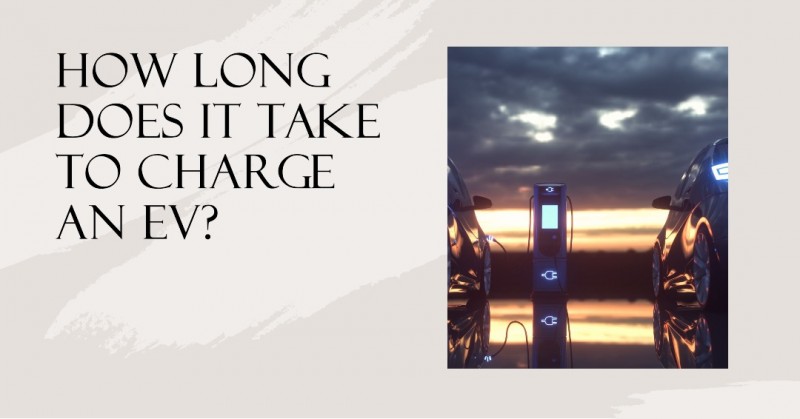
In recent years, electric vehicles (EVs) have gained significant popularity as a greener alternative to traditional gasoline-powered cars. As more people transition to EVs, one common question that arises is, "How much time does it take to charge an electric vehicle?" In this article, we will explore the various factors that influence the charging time of an electric vehicle, the different types of charging options available, and tips to optimize charging speed. So, let's dive in and discover the fascinating world of EV charging!
1. Introduction
Electric vehicles have become increasingly popular due to their environmental benefits and cost savings over time. However, unlike traditional gasoline cars that can be refueled within minutes, charging an electric vehicle takes a bit more time. The charging time varies depending on several factors, which we will discuss in detail.
2. Factors Affecting EV Charging Time
The time it takes to charge an electric vehicle is influenced by the following factors:
Battery Capacity
The size of the battery pack in an electric vehicle plays a crucial role in determining the charging time. Generally, EVs with larger battery capacities will take longer to charge compared to those with smaller battery capacities. However, advancements in charging technology have significantly reduced the overall charging time for most electric vehicles.
Charging Station Power
The power output of the charging station also affects the charging time. Charging stations are typically classified by their power levels: Level 1, Level 2, and DC fast charging. Level 1 charging operates at 120 volts AC and provides the slowest charging speed, while Level 2 charging operates at 240 volts AC and offers a faster charging rate. DC fast charging, available at select charging stations, can provide a significant amount of charge in a short amount of time.
Charging Cable Capacity
The capacity of the charging cable used to connect the electric vehicle to the charging station also affects the charging time. Thicker cables with higher capacities can transmit more electrical current, resulting in faster charging speeds. It is essential to use the appropriate charging cable for your electric vehicle to ensure efficient and safe charging.
Temperature
Temperature can impact the charging time of an electric vehicle. Charging in extremely cold or hot temperatures may slow down the charging process. It is recommended to park your EV in a temperature-controlled environment whenever possible to optimize charging speed.
3. Types of EV Charging
There are three main types of EV charging:
Level 1 Charging
Level 1 charging refers to using a standard household outlet (120 volts AC) to charge the electric vehicle. It is the slowest charging option, typically adding around 4-5 miles of range per hour. Level 1 charging is suitable for overnight charging or when the vehicle is parked for an extended period.
Level 2 Charging
Level 2 charging utilizes a dedicated charging station operating at 240 volts AC. It offers a faster charging speed compared to Level 1 charging, typically adding around 25-30 miles of range per hour. Level 2 charging is commonly installed at homes, workplaces, and public charging stations.
DC Fast Charging
DC fast charging, also known as Level 3 charging, is the fastest charging option available. These charging stations provide a high-powered DC current directly to the vehicle's battery, allowing for rapid charging. DC fast charging can add approximately 100 miles of range in as little as 20-30 minutes. However, it's important to note that not all electric vehicles are compatible with DC fast charging.
4. Tips to Optimize Charging Speed
To make the most of your electric vehicle's charging time, consider the following tips:
Upgrade Charging Equipment
If you frequently rely on Level 1 charging, upgrading to a Level 2 charging station can significantly reduce the charging time. Level 2 chargers are more powerful and can add more range per hour of charging.
Utilize Smart Charging
Many electric vehicles and charging stations offer smart charging features. These features allow you to schedule charging sessions during off-peak hours when electricity rates are lower. By taking advantage of smart charging, you can save money on charging costs and potentially experience faster charging speeds.
Plan Charging Sessions
Planning your charging sessions in advance can help optimize your EV's charging time. By ensuring that your vehicle is adequately charged before embarking on long trips, you can minimize the need for frequent charging stops and reduce overall travel time.
Maintain Battery Health
Keeping your EV's battery in good health can also contribute to faster charging speeds. Regularly follow the manufacturer's guidelines for battery maintenance, such as avoiding extreme temperature conditions and not frequently charging to 100% or discharging to 0%.
5. Conclusion
The charging time of an electric vehicle varies depending on factors such as battery capacity, charging station power, charging cable capacity, and temperature. While Level 1 charging is the slowest option, Level 2 and DC fast charging provide faster charging speeds. By considering these factors and implementing optimization strategies, EV owners can make the most of their charging time and enjoy the benefits of electric transportation.